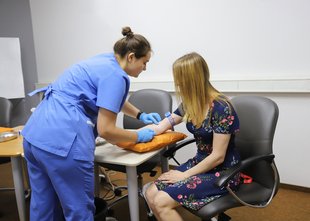Are blood tests the holy grail for early diagnosis of ovarian cancer?

New results from a trial testing the Galleri blood test have reignited the conversation about whether a simple blood test could transform early cancer detection, but what does this mean for ovarian cancer?
What is the Galleri blood test?
The Galleri test is a blood test that can potentially detect signs of over 50 types of cancer.
This test (developed by GRAIL Inc.) analyses fragments of tumour DNA circulating in the blood with the aim to detect more than 50 cancer types. It’s one of several “multi-cancer early detection” (MCED) tests being explored worldwide.
In the UK, it is currently being evaluated through the NHS Galleri trial, which is following 140,000 participants across England to understand whether using the test in real world screening can help detect cancer earlier and save lives.
What did the Galleri blood test trial show?
The results from the NHS trial are expected in 2026. The results will be looked at by the UK National Screening Committee to consider whether the Galleri test could play a role in a national cancer screening programme.
Can the Galleri blood test detect ovarian cancer?
Researchers in the USA have been studying whether this simple blood test could help spot cancers early, when treatment is most effective. This approach is important because many cancers, like ovarian cancer, are often diagnosed too late for the best outcomes.
The study (PATHFINDER-2) tested the Galleri multi-cancer early detection test and the results presented at an Oncology conference this year (ESMO Congress 2025) showed that while the test successfully identified some cancers early, none of the cancers it detected at an early stage were ovarian cancer.
This confirms that, at present, there is still no evidence that Galleri, or any blood test, can detect ovarian cancer early enough to be used as a reliable screening tool.
Why is finding a test to detect ovarian cancer important?
Early detection remains one of the biggest challenges in improving ovarian cancer survival. When diagnosed at stage 1, over 90% of women live five years or more. But only around 30% are diagnosed that early.
Why blood tests alone aren’t enough for ovarian cancer
Ovarian cancer behaves differently. Whilst Galleri and similar multi-cancer tests show great promise in detecting some cancers, particularly those with distinct DNA signatures in the bloodstream, there’s been no evidence to prove that they are effective in early detection of ovarian cancer. Ovarian cancer often starts deep in the pelvis, shedding very little tumour DNA until later stages, which means testing for DNA in the bloodstream isn’t a viable option.
Even advanced technologies struggle to pick it up early, and false reassurance from a negative test could delay an ovarian cancer diagnosis – which could cost lives.
So, while blood-based early detection remains an important area of research, we can’t rely on these tests alone to catch ovarian cancer early. Instead, we must look at the problem from another angle, stopping cancer before it starts.
A new frontier with OvarianVax - preventing ovarian cancer before it develops
At Ovarian Cancer Action, we’re tackling ovarian cancer from every angle. Funding cutting-edge research to detect earlier and pioneering prevention through projects like OvarianVax.
Led by Professor Ahmed Ahmed at the University of Oxford and funded by Ovarian Cancer Action and Cancer Research UK, OvarianVax aims to develop the world’s first preventive ovarian cancer vaccine.
The project builds on years of Ovarian Cancer Action-funded work to understand how ovarian cancer begins at the cellular level. By identifying the unique proteins that appear on the surface of cells at the earliest stages of disease, the team is designing a vaccine to train the immune system to recognise and destroy those cells before cancer can develop.
This approach could one day protect women who carry inherited gene faults, such as BRCA1/2, or who are otherwise at high risk, offering hope not just for earlier detection, but true prevention. One day, we hope it could be used for all women.
The bottom line
Blood tests like Galleri are a welcome advance and could be a gamechanger for early detection in some cancers. But for ovarian cancer, we’re not there yet.
Because every woman deserves a future where ovarian cancer can be prevented, not just treated.